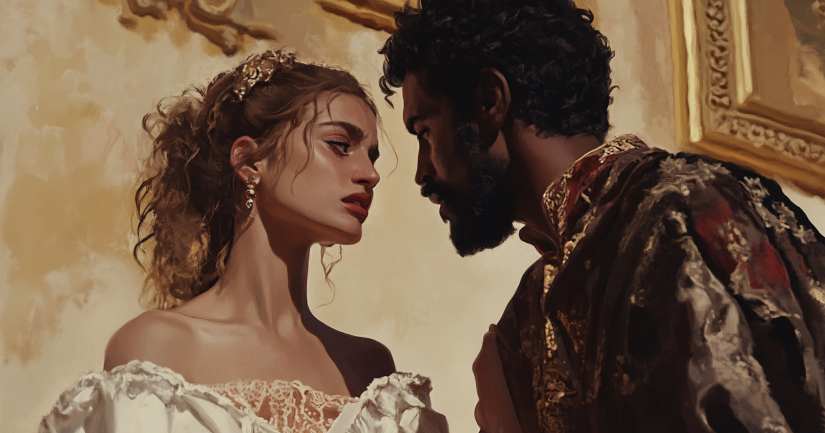
With the Othello Act 3 Scene 4 Quiz, dive into Shakespeare’s layered exploration of loyalty, jealousy, and hidden intentions that define this intense scene. This quiz invites you to explore Act 3, Scene 4, a pivotal moment in the play. Here, the seeds of jealousy and doubt begin to sprout, leading to dramatic consequences. As you delve into this scene, you’ll uncover the nuances of character interactions and the subtle shifts in Othello’s demeanor.
Discover how Desdemona’s innocence contrasts with Othello’s growing suspicion. Notice how Iago’s manipulations continue to ensnare those around him. Each question will challenge your understanding of the text, encouraging you to think deeply about the motivations and emotions driving the characters.
This scene leaves much to ponder. For a broader perspective, revisit Othello Act 3 quiz, or step into the escalating drama of Othello Act 4 Scene 1 quiz.
By engaging with this quiz, you’ll gain a richer appreciation of Shakespeare’s mastery in crafting tension and drama. You’ll see how a single scene can encapsulate the themes of trust, betrayal, and the tragic flaws that lead to downfall. Are you ready to test your insights and deepen your understanding of this timeless work?
Othello Quizzes: Master the Play …
What Happens – Othello Act 3 Scene 4
Desdemona talks to the clown and asks him to find Cassio. She wants to speak with him. The clown leaves to find Cassio. Desdemona is worried about losing a handkerchief that Othello gave her. Othello arrives and asks Desdemona for the handkerchief. Desdemona avoids the question and talks about Cassio instead. Othello insists on the handkerchief. He tells her it is special and magical. Desdemona keeps changing the subject back to Cassio. Othello gets angry and leaves.
Cassio enters with Iago and talks to Desdemona. Desdemona assures Cassio that Othello will forgive him soon. Cassio is hopeful and leaves with Iago. Emilia stays with Desdemona. Desdemona is worried that Othello is acting strangely. Emilia suggests that Othello might be jealous. Desdemona denies this and says Othello has no reason to be jealous.
Meanwhile, Cassio meets Bianca. He gives her the handkerchief he found in his room. He asks her to copy the pattern. Bianca is upset because Cassio has not visited her for a week. She thinks he might have another lover. Cassio explains he has been busy. Bianca agrees to copy the handkerchief and leaves. Cassio hopes to get back in Othello’s good graces.
The scene ends with Desdemona still worried about Othello’s behavior.
Othello Act 3 Scene 4 – Quotes
- “I have a salt and sorry rheum offends me; Lend me thy handkerchief.” – Othello, ‘Othello asks Desdemona for the handkerchief that holds significant emotional value and later becomes pivotal in Iago’s plot.’
“Believe me, I had rather have lost my purse / Full of crusadoes.” – Desdemona, ‘She expresses to Emilia that losing the handkerchief is more distressing than losing money, highlighting its importance.’
“Is not this man jealous?” – Emilia, ‘She questions Desdemona about Othello’s behavior, hinting at the growing suspicion and tension in their relationship.’
“The handkerchief!” – Othello, ‘Repeatedly demands the handkerchief from Desdemona, emphasizing his obsession and the object’s symbolic importance.’
“My lord is not my lord; nor should I know him, / Were he in favor as in humor altered.” – Desdemona, ‘She observes the dramatic change in Othello’s demeanor, foreshadowing his tragic transformation.’
“They are all but stomachs, and we all but food.” – Emilia, ‘She cynically describes men’s insatiable desires and how women are used and discarded, reflecting feminist themes.’
“This is some token from a newer friend.” – Othello, ‘Othello accuses Desdemona of infidelity, interpreting the missing handkerchief as evidence of her betrayal.’
“Something, sure, of state, / Either from Venice, or some unhatch’d practice / Made demonstrable here in Cyprus, to him.” – Desdemona, ‘She tries to rationalize Othello’s change as stress from political matters, showcasing her innocence and trust.’
Othello Act 3 Scene 4 – FAQ
The handkerchief in this scene is a key symbol. It signifies Othello’s love for Desdemona and acts as a token of fidelity. When it’s lost and later found, it stokes Othello’s jealousy and suspicion, driving the play’s tragic events. Its symbolism highlights themes of trust and betrayal.
Desdemona’s demeanor shifts from confident to anxious. She starts assertively, trying to support Cassio, but grows anxious as Othello questions her about the handkerchief. Her distress and inability to grasp Othello’s sudden change reveal her vulnerability and confusion.
Othello demands the handkerchief as a test of Desdemona’s fidelity. Manipulated by Iago, he believes it proves her infidelity. His insistence shows his growing paranoia and insecurity, fueled by Iago’s deceit and his own fears.
Emilia plays a crucial but subtle role. She unknowingly aids Iago’s scheme by giving him the handkerchief, unaware of its impact. Her observations highlight gender dynamics and power struggles in relationships, adding depth to the drama.
This scene hints at the tragic breakdown of trust and relationships. The focus on the handkerchief and Othello’s increasing jealousy foreshadow the tragedy. Desdemona’s innocence and Othello’s mistrust predict disastrous outcomes driven by manipulation and misunderstanding.
